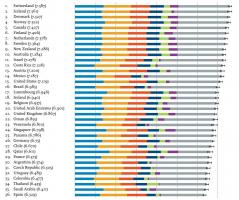The difference between Great Britain, United Kingdom and England
The British Isles are a group of islands that form an archipelago located in northwestern Europe, made up of two large main islands and a group of smaller islands around them. In them we find one of the powers that has historically had the greatest power in Europe: the United Kingdom.
But we often refer to the inhabitants of these islands as English, or we fail to distinguish correctly between Great Britain, the United Kingdom and England. And although deeply associated they are not synonymous: they do not imply exactly the same thing. An inhabitant of the United Kingdom does not have to be English, for example, and not even properly British.
So what are the differences between England, United Kingdom and Great Britain? In this article we are going to delve into them.
- You may be interested: "The 10 happiest countries in the world, according to the UN"
Main differences between the United Kingdom, Great Britain and England
Although today a large part of the population knows the differences by general culture or because they have traveled to the United Kingdom in some At the moment, it is not uncommon for there to be doubts and confusion as to what exactly it is or how Britain, the United Kingdom and the United Kingdom differ. England. This can lead to uncomfortable situations in which an inhabitant of one of these regions is offended by confusing him or identifying him with another:
for example, identify a Scotsman with an English. That is why we are going to observe some of the main differences that exist below.Drive type: political or physical
One of the elements that differentiates Great Britain from the other two entities mentioned above is the fact that in the Currently only what is understood by Great Britain is only the largest of the islands of the archipelago of islands British. England and UK refer to political units, not merely territorial. However, in the past the Kingdom of Great Britain was a political entity and not just a physical one.
- You may be interested: "8 countries to go to start a new life from scratch"
Differences at the political entity level
One of the biggest differences between the aforementioned territories is that they include different political entities. The United Kingdom is a country that is made up of four different nations: England, Scotland, Wales, and Northern Ireland. A) Yes, Although England is part of the United Kingdom, it does not represent the entire country, but to one of its parts (specifically the most populated and important economically and politically).
With regard to Great Britain, it is understood as such the island on which three of these nations are located, specifically Scotland, Wales and England. In fact, they formerly formed the Kingdom of Great Britain, which was generated with the political union of the kingdoms of Scotland and England. The United Kingdom (technically the United Kingdom of Great Britain and Northern Ireland) would not exist as such until the country's incorporation of the territory of Northern Ireland in 1800.
Political system
The set of territories that are part of the United Kingdom (including Great Britain which in turn includes England) share nationality, monarch, prime minister and the parliament of the United Kingdom. But despite this, there are differences at the level of the political system: while England does not have its own political system in addition to what previously mentioned, the rest of the territory that are part of Great Britain and the United Kingdom have their own ministers and parliaments in addition to the central.
Territory occupied by each
Another of the main differences is at the level of physical terrain. England is a country located on the island of Great Britain, but does not occupy it in its entirety but shares it with other countries. Specifically with Scotland and Wales.
With regard to the United Kingdom, it is part of the group of countries that are located on the island of Great Britain, but also includes a part of the island of Ireland (specifically, Northern Ireland) and different smaller islands bordering them. Thus, at the territorial level there are differences between Great Britain, England and the United Kingdom.
Idiom
One of the most frequent causes of confusion is found in the fact that the official language of the United Kingdom is English, which would be the native language of England. But this does not mean that there are no other languages in the country, each of the nations that are part of United Kingdom their own language, which is co-official with English in their respective territories: Scottish, Welsh and Irish. In fact, the differences are greater than believed, since while English is based on the Germanic language and brass the rest of the languages of the United Kingdom have mainly Celtic origin.


